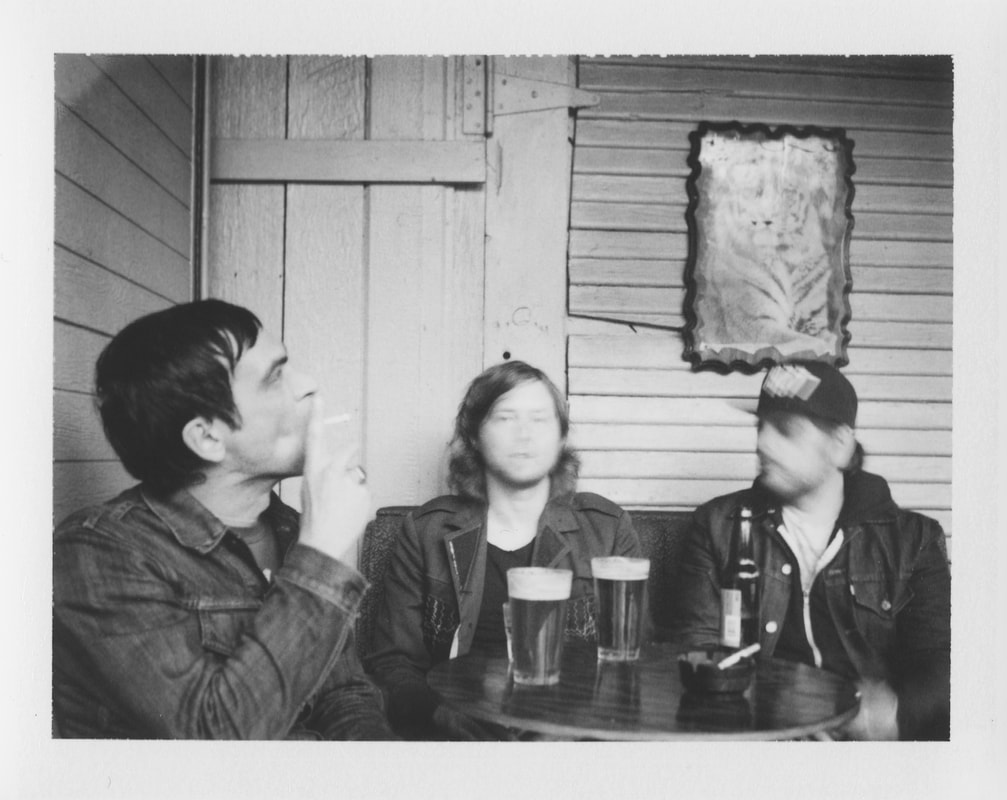Biography • Press
Out of the Pacific Northwest of the U.S.A. emerges a rock and roll band by the name of Bombay Beach. After holing up in a studio to develop their live set and the release of a 7”, Matt Zimmerman (vocals/bass), Jeremiah Hayden (drums/vocals), and Ryan Lynch (guitars, pedals, sounds, vocals) now set loose their debut album Death Tape. Historically, rock music has often been thought of as an exception to art — as if its status as nonpaintingmakes it ordinary — and occasionally still, rock and roll is viewed as the work of aberrant groups of aggressive men. But Bombay Beach as a band turns out to be what contemporary art has become: genre mixing, nonsolipsistic, timebased, not exclusive, and in many ways free. The songs on Death Tapeand the performances it necessitates started out “just for us,” as the band recollects, but are now shared with anyone who wants them. The offthecuff nature of their recorded and performed music is telling of the work the band put in, as they work more or less intuitively. Although parts of the record were labored over, a good portion of what’s heard on Death Tapeis firsttake. The band’s ability to be cool (read: poised)comes from experience as much as their being fed up. As drummer Jeremiah Hayden puts it, “we’re at our best when we forget what’s outside and simply make the music we want to hear.” They’re calling this the time of a “New American Rage,” and they’re turning to music, c r e a t i v e m y t h o l o g y , a n d a r t i s t i c c o m m u n i t y t o r e p u r p o s e i t . R a g e h a s a l w a y s b e e n h e r e — “waiting” as Burroughs has said — and the music from Bombay Beach reminds us through blistering heretical sounds that it’s ever renewing its lease on the land. It can be said that this group is different from what America as a group has become. And yet they are the quintessence of it. The band’s formation was occasioned, after all, by a mutual escape from boredom, for the exploration of new ideas. A confluence of spontaneous acts occurs when there’s nothing on the agenda to inhibit creativity, and for Bombay Beach, a sequence of practices has been pursued without notable interruption for a couple of years running. The three met up one day in a room in Southeast Portland to see what would happen, and the results pleased them enough not to stop. Through cathartic performances, as with its utility of record production, Bombay Beach has emptied its work of gestures without meaning, and they’re cutloose enough to make a different kind of sense. Take for example the track, “Murder USA” where, after a fast driving drum and bass entrance and what can only be described as ‘80s video game sounds, shoobedoowopis growled over a steady beat; or in the tales Matt Zimmerman’s lyrics tell with the help of the cinematic rollout of each track by way of varied tempos, genremixing noise and ambience (as in “Singularity Chorus”). Many of the sounds and lyrics here are in service of a bigger narrative the band is currently working up for a film. The “Future Fever” Matt Zimmerman, Ryan Lynch, and Jeremiah Hayden holler about has everything to do with being disgusted by the way the world is, and they approach it with a lust for the rally of its essence. You can hear this clear in the vibe of Zimmerman’s slurs, articulated staccato deliveries and dustchoked croons; in the delays and tumbling rhythms, the welltimed crashes from Hayden’s drums; the licks and composed chaos of Lynch’s guitars, pedal sounds, beats, and other conceptual orchestrations. The Death Taperage has a certain levelheadedness behind it, and it comes through in a way that often best befits change: in collective raucous fun, beauty in the wrong note, the atonal, the spontaneous utterances and rollicking tempos that signify the questioning of conventions, the subversion of the everyday story. This is an escape familiar to us since as far back as we have record to account for the tyrannies of living. As the band has earlier stated theirs has been a reaction to overzealous American commercial development, the elimination of its middle class, a squeeze on the lower class, and the silencing of creativity and healthy dissent in contemporary culture. The story that Bombay Beach tells is like the stories youths have told themselves and have never stopped tiring of living out. In the end, this isn’t some blinddrunk fantasy of no limits, but a drive beset with clarity. “I need you like you need me” Zimmerman sings in the album’s closing track, to the sounds of rain on street. In its striving to “make something happen,” its swagger, and its desire to liven things up with noise, Bombay Beach will gather in dives, dusty old rooms, YMCAs, or in the backs of rented vans. Following this debut, the group will see the release of the visual component to this album, a movie based on the characters and scenes that the music has been written to, and the release of minimalist electronic works to emerge in the coming year. Active Members: Matt Zimmerman, Jeremiah Hayden, Ryan Lynch
Related Artists: Kelli Scheafer Related Labels: Self Group, Amigo/Amiga Releases
|
|
- News
-
Artists
- Animism
- Bombay Beach
- C^VES
- dharmakaya
- Disappearersss
- Drew Grow
- Ellipsism
- Healersss
- Institute For Creative Dying
- Kelli Schaefer
- KING WHO
- Metallic Hiss
- Modern Kin
- Morher
- Mothertapes
- Sama Dams
- Self Group Live Series
- Self Group [Princess] Leia's Picks
- SEVA [Literary]
- Sndtrkr
- Southerly
- Themes
- Yardandansss
- Yardsss
- Blahg
- Rx Fest
- SGC Projects
- About
- Mart
DIY creative collectivists from down the street, Portland, OR USA | (c) & (p) 2010-2023 Self Group Collective | Email List | Street Team
- News
-
Artists
- Animism
- Bombay Beach
- C^VES
- dharmakaya
- Disappearersss
- Drew Grow
- Ellipsism
- Healersss
- Institute For Creative Dying
- Kelli Schaefer
- KING WHO
- Metallic Hiss
- Modern Kin
- Morher
- Mothertapes
- Sama Dams
- Self Group Live Series
- Self Group [Princess] Leia's Picks
- SEVA [Literary]
- Sndtrkr
- Southerly
- Themes
- Yardandansss
- Yardsss
- Blahg
- Rx Fest
- SGC Projects
- About
- Mart

